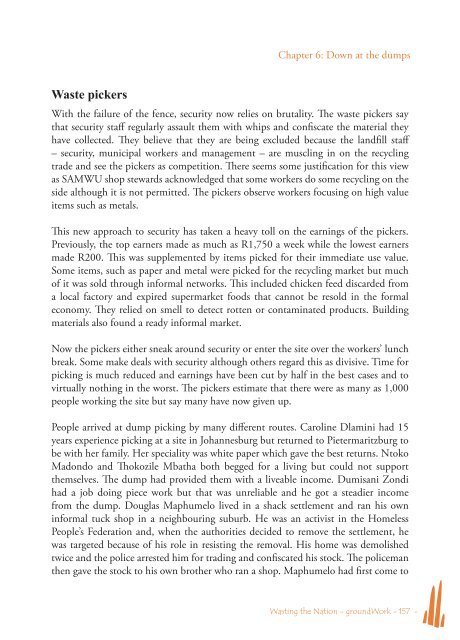Wasting the Nation.indd - Groundwork
Wasting the Nation.indd - Groundwork
Wasting the Nation.indd - Groundwork
You also want an ePaper? Increase the reach of your titles
YUMPU automatically turns print PDFs into web optimized ePapers that Google loves.
Chapter 6: Down at <strong>the</strong> dumpsWaste pickersWith <strong>the</strong> failure of <strong>the</strong> fence, security now relies on brutality. The waste pickers saythat security staff regularly assault <strong>the</strong>m with whips and confiscate <strong>the</strong> material <strong>the</strong>yhave collected. They believe that <strong>the</strong>y are being excluded because <strong>the</strong> landfill staff– security, municipal workers and management – are muscling in on <strong>the</strong> recyclingtrade and see <strong>the</strong> pickers as competition. There seems some justification for this viewas SAMWU shop stewards acknowledged that some workers do some recycling on <strong>the</strong>side although it is not permitted. The pickers observe workers focusing on high valueitems such as metals.This new approach to security has taken a heavy toll on <strong>the</strong> earnings of <strong>the</strong> pickers.Previously, <strong>the</strong> top earners made as much as R1,750 a week while <strong>the</strong> lowest earnersmade R200. This was supplemented by items picked for <strong>the</strong>ir immediate use value.Some items, such as paper and metal were picked for <strong>the</strong> recycling market but muchof it was sold through informal networks. This included chicken feed discarded froma local factory and expired supermarket foods that cannot be resold in <strong>the</strong> formaleconomy. They relied on smell to detect rotten or contaminated products. Buildingmaterials also found a ready informal market.Now <strong>the</strong> pickers ei<strong>the</strong>r sneak around security or enter <strong>the</strong> site over <strong>the</strong> workers’ lunchbreak. Some make deals with security although o<strong>the</strong>rs regard this as divisive. Time forpicking is much reduced and earnings have been cut by half in <strong>the</strong> best cases and tovirtually nothing in <strong>the</strong> worst. The pickers estimate that <strong>the</strong>re were as many as 1,000people working <strong>the</strong> site but say many have now given up.People arrived at dump picking by many different routes. Caroline Dlamini had 15years experience picking at a site in Johannesburg but returned to Pietermaritzburg tobe with her family. Her speciality was white paper which gave <strong>the</strong> best returns. NtokoMadondo and Thokozile Mbatha both begged for a living but could not support<strong>the</strong>mselves. The dump had provided <strong>the</strong>m with a liveable income. Dumisani Zondihad a job doing piece work but that was unreliable and he got a steadier incomefrom <strong>the</strong> dump. Douglas Maphumelo lived in a shack settlement and ran his owninformal tuck shop in a neighbouring suburb. He was an activist in <strong>the</strong> HomelessPeople’s Federation and, when <strong>the</strong> authorities decided to remove <strong>the</strong> settlement, hewas targeted because of his role in resisting <strong>the</strong> removal. His home was demolishedtwice and <strong>the</strong> police arrested him for trading and confiscated his stock. The policeman<strong>the</strong>n gave <strong>the</strong> stock to his own bro<strong>the</strong>r who ran a shop. Maphumelo had first come to<strong>Wasting</strong> <strong>the</strong> <strong>Nation</strong> - groundWork - 157 -
















